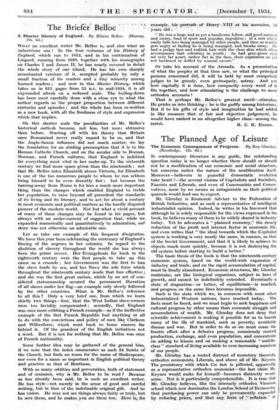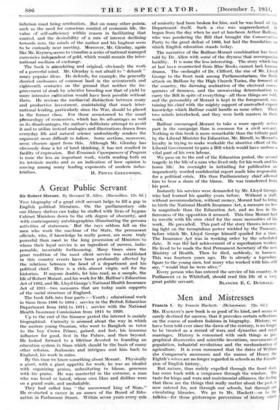The Planned Age of Leisure
The Economic Consequences of Progress. By Roy Glenday.
(Routledge. 12s. 6d.) •
IF contemporary literature is any guide, the outstanding qUestion today is no longer whether there should or should not be a modification of our economic and social structure, but concerns rather the nature of the modification itself. Moreover—believers in peaceful democratic evolution take heart 1—the several visions of Capitalists and Socialists, Fascists and Liberals, and even of Communists and Conser- vatives, seem by no means as antagonistic as their political quarrels would lead one to expect.
Mr. Glenday is Economic Adviser to the Federation of British Industries, and as such a representative of intelligent industrialist opinion. Indeed, he writes in his foreword that although he is solely responsible for the. views expressed in his book, he believes many of them to be widely shared in industry, today. Yet he advocates a " planned economy," the steady
reduction of the profit and interest factor in economic life, and even writes that " the ideal towards which the Capitalist system is working is very nearly the same, in essence, as that of the Soviet Government, and that it is likely to achieve its objects much more quickly, because it is not destroying the old system before starting to build a better."
The basic thesis of the book is that the nineteenth-century economic system, based on the world-wide expansion of industry and trade, and on the rapid accumulation of capital, must be finally abandoned. Economic structures, Mr. Glenday, maintains, are like biological organisms, subject to laws of
growth, and cannot be indefinitely extended. Eventually ,a state of stagnation—or better, of equilibrium—is reached, and progress on the same lines becomes impossible.
Such is the state which we, in common with most other industrialized Western nations, have reached today. The facts must be faced, and we must begin to seek happiness and
cultural progress. by other means than economic struggle and accumulation of wealth. Mr. Glenday does not deny that
scientific achievement is making it possible for us to banish many of the ills of mankind, such as poverty, avoidable disease and war. But in order to do so we must cease the frantic effort after a delusive progress, consciously control production, exchange, and even population, and ,concentrate on adding to leisure and on making a reasonable " middle- class " standard of living available to ever-increasing numbers of our people.
Mr. Glenday has a rooted distrust of monetary theorists, orthodox economists, Liberals, and above all of Mr. Keynes. The persistency with which the last is pilloried, apparently as a representative orthodox economist—the last claim Mr. Keynes would make for himself—becomes distinctly weari. some. Nor is it particularly comprehensible. It is true that Mr. Glenday believes, like the intensely orthodox Viennese school which now dominates the London School of Economics, that purchasing power can only be permanently expanded by reducing prices, and ,that. any :form of t` refiation " or
inflation must bring retribution. But on many other points, such as the need for conscious control, of economic life, the value of self-sufficiency within reason in facilitating that control, and the desirability of a rate of interest declining towards zero, the minds of the author and his bugbear seem to be curiously -near meeting. Moreover, Mr. Glenday, again like Mr. Keynewseems to visualize a series of national managed currencies independent of gold, which would remain the inter- national mediums of exchange.
The book fs atiiinulating and original, obviously the work of a powerful mind. Mr. Glenday is not afraid to " debunk " many popular ideas. He defends, for example, the generally decried enclosures of common' hind in . the seventeenth and eighteenth centuries on the ground that neither the im- prOvement of stook by selective breeding nor that of yield by more intensive Cultivation would have been pdssibk without them. He revives the mediaeVal distinction between usury and productive investment, maintaining. that much inter- national lending, particularly since the War, should be placed in the former class. For those accustomed to the usual phraseology of economists, which has its advantages as well as its disadvantages, the author's deliberate attempt to avoid it and to utilize instead analogies and illustrations drawn from everyday life and natural science undoubtedly renders the argument more difficult to follow. Some sections, moreover, seem obscure apart from this. AlthOugh Mr. Glenday has obviously done a lot of hard thinking, it has not resulted in facility of expression. But Econionic Consequences of Progress is none the less an impbrtant work, worth -reading both on its intrinsic merits and as an indication of how opinion is moving among many leading exponents of modem indus-



















































 Previous page
Previous page